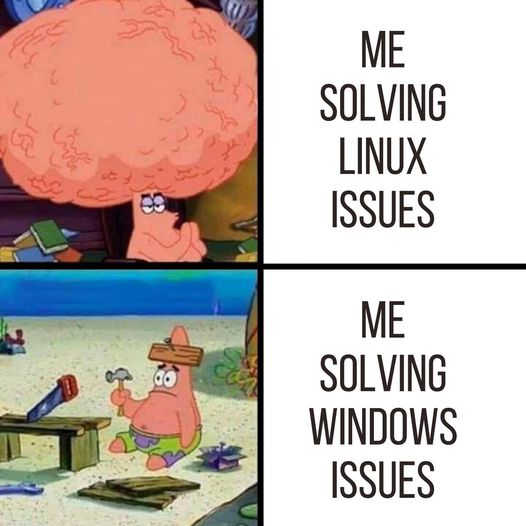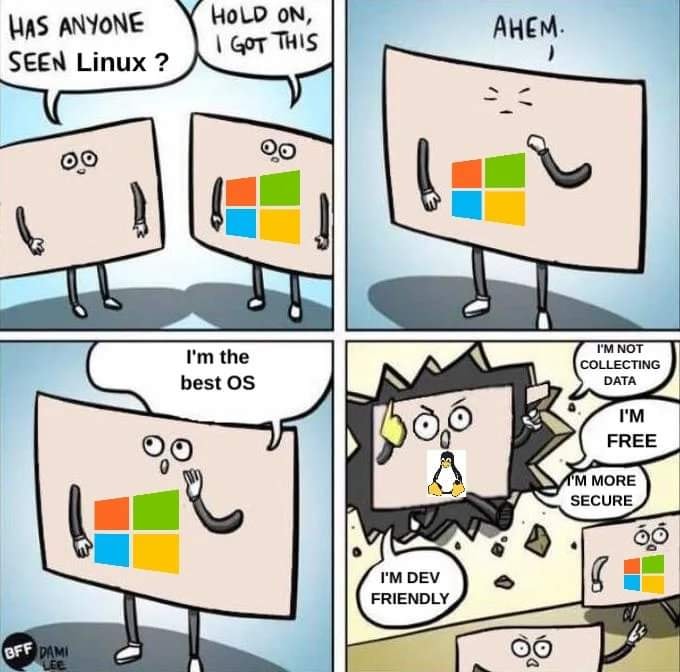September 2023
Raspberry Pi 5 is coming!
30-09-2023 09:50 > Raspberry Pi :: Raspberry Pi 5 :: Technology :: New Technologies :: New Products :: Hardware :: Hardware Development :: Computing
Communist Fascism = Nazi Fascism
29-09-2023 19:39 > Politics :: Opinions :: Social Engineering :: Matrix :: Wake up! :: Communism :: Communist Fascism :: Nazism :: Nazi Fascism


Me solving issues...
29-09-2023 19:38 > Linux :: Linux Jokes :: Linux Fun :: Linux Humor :: Linux Memes :: Computer Fun :: Computer Jokes :: Computer Humor :: Computer Memes :: Windows

Has anyone seen Linux?
13-09-2023 07:25 > Linux :: Linux Jokes :: Linux Fun :: Linux Humor :: Linux Memes :: Computer Fun :: Computer Jokes :: Computer Humor :: Computer Memes :: Windows Fun :: Windows Jokes :: Windows Humor :: Windows Memes :: Windows

The guy who made the Gnome bomb...
07-09-2023 07:54 > Gnome :: Linux :: Linux Jokes :: Linux Fun :: Linux Humor :: Linux Memes :: Computer Fun :: Computer Jokes :: Computer Humor :: Computer Memes

An Open Letter to Intel
Dear Mr. Krzanich,
Thanks for putting a version of MINIX inside the ME-11 management engine chip used on almost all recent desktop and laptop computers in the world. I guess that makes MINIX the most widely used computer operating system in the world, even more than Windows, Linux, or MacOS. And I didn't even know until I read a press report about it. Also here and here and here and here and here (in Dutch), and a bunch of other places.
I knew that Intel had some potential interest in MINIX several years ago when one of your engineering teams contacted me about some secret internal project and asked a large number of technical questions about MINIX, which I was happy to answer. I got another clue when your engineers began asking me to make a number of changes to MINIX, for example, making the memory footprint smaller and adding #ifdefs around pieces of code so they could be statically disabled by setting flags in the main configuration file. This made it possible to reduce the memory footprint even more by selectively disabling a number of features not always needed, such as floating point support. This made the system, which was already very modular since nearly all of the OS runs as a collection of separate processes (normally in user mode), all of which can be included or excluded in a build, as needed, even more modular.
Also a hint was the discussion about the lisence. I (implicitly) gathered that the fact that MINIX uses the Berkeley license was very important. I have run across this before, when companies have told me that they hate the GPL because they are not keen on spending a lot of time, energy, and money modifying some piece of code, only to be required to give it to their competitors for free. These discussions were why we put MINIX out under the Berkeley license in 2000 (after prying it loose from my publisher).
After that initial burst of activity, there was radio silence for a couple of years, until I read in the media (see above) that a modified version of MINIX was running on most x86 computers, deep inside one of the Intel chips. This was a complete surprise. I don't mind, of course, and was not expecting any kind of payment since that is not required. There isn't even any suggestion in the lisence that it would be appreciated.
The only thing that would have been nice is that after the project had been finished and the chip deployed, that someone from Intel would have told me, just as a courtesy, that MINIX was now probably the most widely used operating system in the world on x86 computers. That certainly wasn't required in any way, but I think it would have been polite to give me a heads up, that's all.
If nothing else, this bit of news reaffirms my view that the Berkeley license provides the maximum amount of freedom to potential users. If they want to publicize what they have done, fine. By all means, do so. If there are good reasons not to release the modified code, that's fine with me, too.
Yours truly,
Andrew S. Tanenbaum
---
Note added later: Some people have pointed out online that if MINIX had a GPL license, Intel might not have used it since then it would have had to publish the modifications to the code. Maybe yes, maybe no, but the modifications were no doubt technical issues involving which mode processes run in, etc. My understanding, however, is that the small size and modular microkernel structure were the primary attractions. Many people (including me) don't like the idea of an all-powerful management engine in there at all (since it is a possible security hole and a dangerous idea in the first place), but that is Intel's business decision and a separate issue from the code it runs. A company as big as Intel could obviously write its own OS if it had to. My point is that big companies with lots of resources and expertise sometimes use microkernels, especially in embedded systems. The L4 microkernel has been running inside smartphone chips for years. I certainly hope Intel did thorough security hardening and testing before deploying the chip, since apparently an older version of MINIX was used. Older versions were primarily for education and newer ones were for high availability. Military-grade security was never a goal.
Second note added later: The online discussion got completely sidetracked from my original points as noted above. For the record, I would like to state that when Intel contacted me, they didn't say what they were working on. Companies rarely talk about future products without NDAs. I figured it was a new Ethernet chip or graphics chip or something like that. If I had suspected they might be building a spy engine, I certainly wouldn't have cooperated, even though all they wanted was reducing the memory footprint (= chip area for them). I think creating George Orwell's 1984 is an extremely bad idea, even if Orwell was off by about 30 years. People should have complete control over their own computers, not Intel and not the government. In the U.S. the Fourth Amendment makes it very clear that the government is forbidden from searching anyone's property without a search warrant. Many other countries have privacy laws that are in the same spirit. Putting a possible spy in every computer is a terrible development.
https://www.cs.vu.nl/~ast/intel/
Thanks for putting a version of MINIX inside the ME-11 management engine chip used on almost all recent desktop and laptop computers in the world. I guess that makes MINIX the most widely used computer operating system in the world, even more than Windows, Linux, or MacOS. And I didn't even know until I read a press report about it. Also here and here and here and here and here (in Dutch), and a bunch of other places.
I knew that Intel had some potential interest in MINIX several years ago when one of your engineering teams contacted me about some secret internal project and asked a large number of technical questions about MINIX, which I was happy to answer. I got another clue when your engineers began asking me to make a number of changes to MINIX, for example, making the memory footprint smaller and adding #ifdefs around pieces of code so they could be statically disabled by setting flags in the main configuration file. This made it possible to reduce the memory footprint even more by selectively disabling a number of features not always needed, such as floating point support. This made the system, which was already very modular since nearly all of the OS runs as a collection of separate processes (normally in user mode), all of which can be included or excluded in a build, as needed, even more modular.
Also a hint was the discussion about the lisence. I (implicitly) gathered that the fact that MINIX uses the Berkeley license was very important. I have run across this before, when companies have told me that they hate the GPL because they are not keen on spending a lot of time, energy, and money modifying some piece of code, only to be required to give it to their competitors for free. These discussions were why we put MINIX out under the Berkeley license in 2000 (after prying it loose from my publisher).
After that initial burst of activity, there was radio silence for a couple of years, until I read in the media (see above) that a modified version of MINIX was running on most x86 computers, deep inside one of the Intel chips. This was a complete surprise. I don't mind, of course, and was not expecting any kind of payment since that is not required. There isn't even any suggestion in the lisence that it would be appreciated.
The only thing that would have been nice is that after the project had been finished and the chip deployed, that someone from Intel would have told me, just as a courtesy, that MINIX was now probably the most widely used operating system in the world on x86 computers. That certainly wasn't required in any way, but I think it would have been polite to give me a heads up, that's all.
If nothing else, this bit of news reaffirms my view that the Berkeley license provides the maximum amount of freedom to potential users. If they want to publicize what they have done, fine. By all means, do so. If there are good reasons not to release the modified code, that's fine with me, too.
Yours truly,
Andrew S. Tanenbaum
---
Note added later: Some people have pointed out online that if MINIX had a GPL license, Intel might not have used it since then it would have had to publish the modifications to the code. Maybe yes, maybe no, but the modifications were no doubt technical issues involving which mode processes run in, etc. My understanding, however, is that the small size and modular microkernel structure were the primary attractions. Many people (including me) don't like the idea of an all-powerful management engine in there at all (since it is a possible security hole and a dangerous idea in the first place), but that is Intel's business decision and a separate issue from the code it runs. A company as big as Intel could obviously write its own OS if it had to. My point is that big companies with lots of resources and expertise sometimes use microkernels, especially in embedded systems. The L4 microkernel has been running inside smartphone chips for years. I certainly hope Intel did thorough security hardening and testing before deploying the chip, since apparently an older version of MINIX was used. Older versions were primarily for education and newer ones were for high availability. Military-grade security was never a goal.
Second note added later: The online discussion got completely sidetracked from my original points as noted above. For the record, I would like to state that when Intel contacted me, they didn't say what they were working on. Companies rarely talk about future products without NDAs. I figured it was a new Ethernet chip or graphics chip or something like that. If I had suspected they might be building a spy engine, I certainly wouldn't have cooperated, even though all they wanted was reducing the memory footprint (= chip area for them). I think creating George Orwell's 1984 is an extremely bad idea, even if Orwell was off by about 30 years. People should have complete control over their own computers, not Intel and not the government. In the U.S. the Fourth Amendment makes it very clear that the government is forbidden from searching anyone's property without a search warrant. Many other countries have privacy laws that are in the same spirit. Putting a possible spy in every computer is a terrible development.
https://www.cs.vu.nl/~ast/intel/
Hyprland - A wayland compositor that doesn't sacrifice on its looks!
06-09-2023 20:00 > Hyprland :: Linux :: Software :: Linux Software :: Wayland :: Wayland Compositors